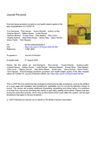More Than 50 Long-Term Effects of COVID-19: A Systematic Review and Meta-Analysis
January 2021
in “
medRxiv (Cold Spring Harbor Laboratory)
”

TLDR COVID-19 can cause over 50 long-term symptoms, with fatigue and headache being the most common.
In 2021, a systematic review and meta-analysis was conducted on the long-term effects of COVID-19, involving 47,910 patients. The study found that 80% of these patients developed one or more long-term symptoms, with the most common being fatigue (58%), headache (44%), attention disorder (27%), hair loss (25%), and dyspnea (24%). The study also identified 55 long-term effects associated with COVID-19, with abnormal chest XRay/CT observed in 34% of the patients and elevated laboratory parameters including interleukin-6 (IL-6), procalcitonin, serum ferritin, C-reactive protein (CRP), N-terminal (NT)-pro hormone BNP (NT-proBNP), and D-dimer. The researchers concluded that more research is needed to understand these long-term effects to develop preventive measures, rehabilitation techniques, and clinical management strategies.







